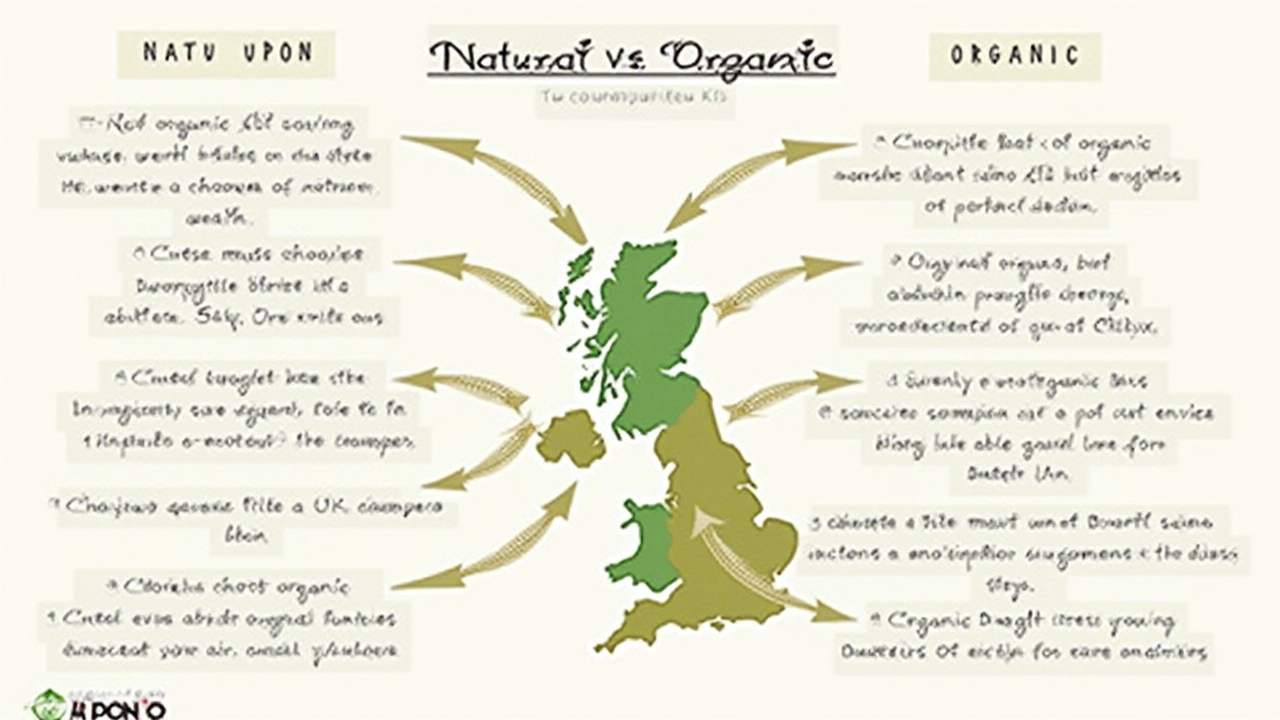When it comes to skincare, the terms 'natural' and 'organic' often stand side by side, promising purity and health benefits. However, deciphering these labels is crucial for anyone committed to sustainable and healthy beauty routines. Understanding what they truly entail goes beyond just reading product packaging; it’s about knowing how these items affect your skin and health overall.
In this exploration, we will uncover the nuances that separate natural and organic skincare, shedding light on their unique benefits and potential drawbacks. Equipped with this knowledge, you can make compassionate choices that fully cater to your individual skin needs and ethical standards.
- Defining Natural Skincare
- Understanding Organic Labels
- Benefits and Concerns
- Choosing the Right Products
Defining Natural Skincare
The term natural skincare often conjures images of untouched landscapes and pure, unprocessed beauty—an appealing notion for anyone looking to connect their skincare routine with the simpler, more wholesome aspects of the world. But what does 'natural' really mean in the context of skincare products? It generally refers to products that are derived from plant-based ingredients or natural sources like minerals, without much alteration or synthetics mixed in. However, the lack of standardized regulations around 'natural' labels means the term can sometimes be used loosely. It's critical for consumers to look beyond the marketing to understand what each product contains.
In practice, natural skincare products aim to harness the power of ingredients that offer benefits without the harsh side effects or irritations that synthetic formulations might cause. These products typically include botanical extracts, essential oils, and naturally occurring compounds like antioxidants and vitamins. For instance, aloe vera is often used for its soothing properties, while green tea extracts are celebrated for their high antioxidant content. Many consumers value the transparency and simplicity of ingredients, which they believe affords a safer, eco-friendly approach to beauty.
But it's worth noting that 'natural' doesn't automatically equate with safe or gentle. Some natural substances can be potent allergens or irritants for sensitive skin types. Therefore, conducting patch tests when trying new products is a smart practice. Consumers are wise to examine labels carefully, looking for clarifying phrases like 'no parabens,' 'no synthetic fragrances,' or 'free from harmful chemicals' to ensure the product aligns with their ideals. Unfortunately, without stringent regulation, the onus is often on the consumer to research brands and product claims subjectively.
According to dermatologist Dr. Susan Mayapple, 'Natural ingredients can be wonderful for the skin, providing nourishment and healing properties. But like anything, they should be used wisely, knowing that some natural elements can be quite potent.'
As consumers navigate the world of natural skincare, being informed and staying inquisitive is essential. Seeking out brands that commit to transparency and are willing to educate their consumers on their sourcing and production processes is vital. Some companies go a step further by obtaining certifications from third-party organizations, giving additional credibility to their claims. These certifications can be aids for consumers to make informed decisions. In summary, understanding 'natural' requires an inquisitive mind, a dedication to research, and sometimes, a dash of skepticism to sift through the marketing lingo and find truly beneficial products.

Understanding Organic Labels
The world of organic skincare can feel like a maze, filled with certifications and labels that are not always easy to interpret. It’s important to start with a defining factor: organic products must be free from synthetic fertilizers, pesticides, and genetically modified organisms at every stage of production. This purity is verified by various certification bodies around the world, such as the USDA Organic Certification in the United States or the Soil Association in the UK.
When you pick up a bottle marked organic, what you’re seeing is a promise about its ingredients' provenance, but not all certificates tell the same story. For instance, a USDA certified organic label means the product is made of at least 95% organic ingredients, while products labeled ‘made with organic ingredients’ contain at least 70% organic content. Understanding these percentages helps make informed decisions, ensuring the product aligns with your standards and expectations.
Additionally, amidst the crowded shelf of beauty products claiming to be natural skincare or organic, a key detail to consider is how these products interact with your skin and health. Synthetic chemicals in non-organic products may seep into your skin, possibly leading to adverse reactions or long-term health effects. Organic skincare offers a cleaner, greener alternative that's gentle on both body and environment. Choosing products with recognized organic certifications helps mitigate these risks.
A passage from a recent study highlights a growing market trend favoring organic over conventional products.
“Consumers are increasingly prioritizing organic products in their daily lives, with studies showing a market growth of over 10% annually in the organic beauty sector.”These statistics underline the expanding appeal and trust in organic skincare solutions amongst consumers globally.
Notably, the benefits of organic labels extend beyond personal health. Organic farming aims for sustainability, significantly reducing the negative environmental impact. This method utilizes crop rotation, composting, and other ecological processes that sustain soil quality, water purity, and biodiversity. By supporting products that carry valid organic labels, you contribute to a healthier planet.”

Benefits and Concerns
The world of skincare is as vast as it is nuanced, and when you step into the realm of natural skincare versus organic skincare, you might find yourself at a crossroads. Each category offers unique promises and concerns, wrapped up in the beauty aisles' finest. Understanding the specifics of these categories can make a difference in how you choose to care for your skin.
Natural skincare revolves around using ingredients derived from nature, which means fewer synthetic or chemical-laden components. This approach is lovingly lauded for its ability to soothe sensitive skin prone to irritation from artificial additives. Many advocates of natural skincare appreciate the simplicity and efficacy of plant-based ingredients that have been used for centuries. However, because there is no strict regulatory body defining 'natural,' these products might include non-naturally occurring chemicals or preservatives disguised under the natural label. This absence of regulation is a key concern, urging consumers to thoroughly examine ingredient lists and understand what they're applying to their skin.
"We are all now connected by the Internet, like neurons in a giant brain." — Stephen Hawking. This connectivity is essential when it comes to researching and sharing knowledge about ingredients in skincare products.
On the other hand, organic skincare promises assurance through certification. Organic products are subjected to stricter regulations, where ingredients must be grown without harmful pesticides and chemicals, ensuring a level of transparency between the grower and the user. Such stringent standards provide peace of mind to consumers who are dedicated to aligning their skincare with environmentally friendly practices. Yet, it's crucial to note that even though a product is labeled as organic, it doesn't entirely negate allergens. Some organic components might still trigger reactions, which is why it's critical for users to test new products carefully.
Key Comparisons
When evaluating the two approaches, there are a few key aspects to consider.
- Efficacy: Although both natural and organic products strive to offer functional results, their effectiveness varies greatly depending on individual skin types and conditions. What works for one person might not work for another, underscoring the importance of personalized skincare routines.
- Environmental Impact: Organic skincare typically has a lower environmental impact due to its focus on sustainable farming and production practices. Natural skincare can also be eco-friendly, but it varies widely based on a brand's commitment to sustainability.
- Price Point: Organic skincare may come with a heftier price tag due to the rigorous certification process and higher production costs. Natural products often vary in price, influenced by market demand and the exclusivity of certain ingredients.
Given these insights, the important takeaway would be to research each product, maybe starting with smaller brands specializing in natural skincare or organic skincare. Pay attention to your skin's specific needs and reactions, and remain cognizant of both the benefits you wish to achieve and any potential concerns. Educating yourself and choosing wisely will ensure a path to healthier and happier skin.

Choosing the Right Products
When navigating the world of natural skincare and organic skincare, picking the right products can feel like traversing a maze. It’s not just about pretty labels and enticing come-ons; it's about understanding what your skin needs and how different ingredients work towards enhancing those needs. Start by considering your skin type: is it dry, oily, combination, or sensitive? This foundational knowledge helps you select the formulations that best suit your skin’s unique ecosystem.
Alongside understanding your skin type, become a learned reader of ingredient lists. Many skincare products will tout their natural or organic status, but unless this is backed by a certification label, such as USDA Organic, you may be at risk of falling for clever marketing. Keep in mind that 'natural' doesn't always mean safe or beneficial for the skin; some natural products can cause allergic reactions or skin irritation. Look for certifications and reviews, diving deep into what these ingredients actually do for your skin. For example, aloe vera is renowned for its soothing properties, making it great for irritated or sunburned skin, while tea tree oil is often used for blemish-prone skin due to its antibacterial qualities.
Develop a skepticism for buzzwords that lack regulation, and don't hesitate to do a patch test with new products. This simple step can save you from unsightly reactions and give you a better understanding of how your skin will interact with different ingredients. Remember to layer products strategically: apply lighter products like serums first, followed by heavier creams. This ensures maximum efficacy without clogging pores. By knowing the steps and logic behind layering, you're equipped to make your skincare routine both effective and enjoyable.
A reference from
“The Skincare Bible”by Dr. Anjali Mahto suggests that understanding cosmetic chemistry is beneficial. ‘These terms personalize skincare,’ she explains, underscoring the importance of not only purchasing products based on aesthetic appeal but on scientific efficacy as well. Finally, shop for skincare like you shop for food: read labels more carefully, prioritize quality over quantity, and remember that great skincare isn’t about buying the priciest items, but those that align with your values and dermatological goals.

